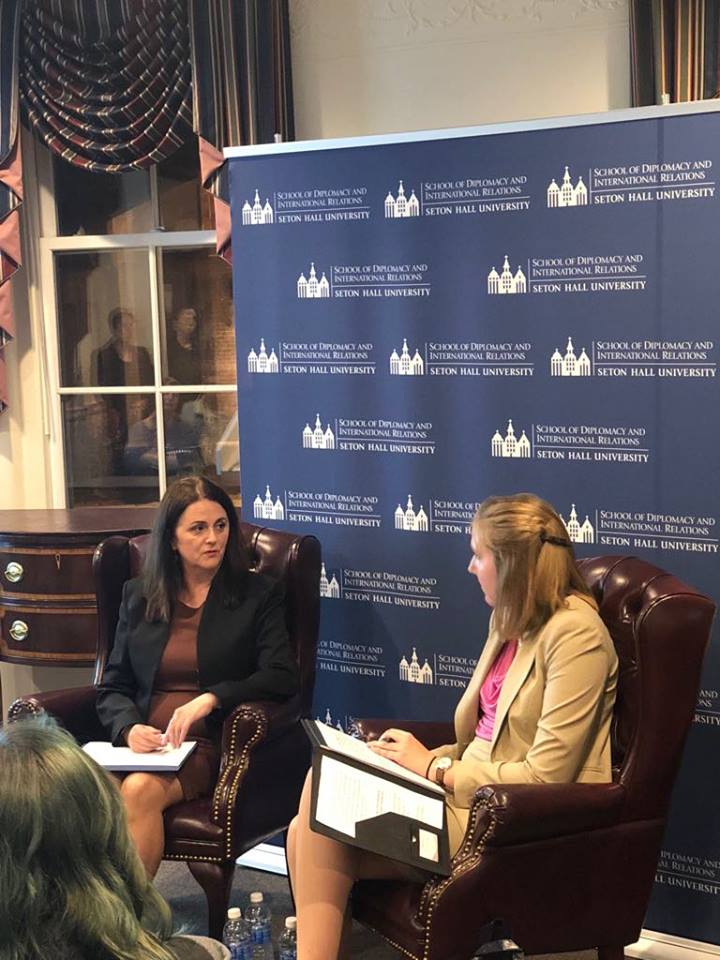NOTE: This guest post was written by Morgan McMichen. Morgan is a graduate student at the Seton Hall School of Diplomacy and International Relations. Her specializations are in International Organizations and Global Negotiations and Conflict Management. Morgan’s interests are the function of international institutions in a global society and negotiation as a means of deterring conflict among multinational actors.
On November 29th, the Ambassador and Consul General of Kosovo in New York, Teuta Sahatqija, spoke to Seton Hall students about Kosovo as a case study of the leadership of women in transitional states. Ambassador Sahatqija captivated her audience by speaking about the thousands of years of history and culture of the decade-old country as well as its strong commitment to gender equality. Until her appointment as Ambassador and Consul General of Kosovo in New York, Ambassador Sahatqija was a member of Parliament representing the Democratic League of Kosovo. She served as the Chair of the Parliamentary Committee on European Integration. Additionally, during her six-years in Parliament, she served as the Vice-Chair of the Parliamentary Caucus of Democratic League of Kosovo, President of Women Cross-Party Parliamentary Caucus, and First Vice-Chair of Parliamentary Committee on Economic Development. She was also the Vice President Democratic League of Kosovo party from 2010-2015. From 2008-2010, the Ambassador served as President of the Reformist Party ORA and an Advisor to former President of the Republic of Kosovo, H.E. Fatmir Sejdiu. Prior to that she was also a member of Parliament from 2004-2007 serving as the Chair of the Parliamentary Group.
“Kosovo”, she told us “is much more than a war-torn autonomous region.” The small, mountainous country, strategically located in the western Balkans is home to a number of UNESCO world heritage sites like the ancient Gračanica and Decani monasteries, as well as new monuments such as the “Newborn” which is dedicated to new beginnings. Though Kosovo did not get its independence from Serbia until 2008, its history dates back to the Paleolithic age and officially, its autonomy was established after WWII. Like many countries in Europe, it has been a part of many empires including the Roman, medieval Serbian, the Byzantine, and the Ottoman. It later became part of communist Yugoslavia and then after its dissolution, a part of Serbia. The Kosovo war of 1998-1999 arose from tensions between the Albanian and Serbian communities in Kosovo and eventually led to Kosovo declaring independence and becoming a state in 2008. The state is recognized by roughly 110 member states and 23 of the 28 member of the EU. Though it is not yet a member state at the UN, Ambassador Sahatquija hopes it will become one in the near future.
Aside from being a new county with a modern constitution, Kosovo is home to many notable women. Mother Teresa was born in the then Ottoman Turkish province of Kosovo to Albanian parents. Rita Sahatçiu, a.k.a.Rita Ora, whose parents are also Albanian, was also born in Kosovo’s capital of Pristina. Atifete Jahjaga was the fourth president of Kosovo and first woman president in the region. Ambassador Sahatqija is also a woman that Kosovo is proud to call its own. Though she is an accomplished politician and diplomat, Ambassador Sahatqija began her career in the STEM field as a Comms and IT Officer as well as a business owner. She earned a Bachelor of Science and a Master of Science in Electronic Engineering from the University of Pristina in Kosovo. She also holds a Graduate Certificate in Women’s, Gender, and Sexuality Studies Program at Dartmouth College in the United States. She described herself as politically engaged for all of her life but it wasn’t until her husband was approached to run for office, and him encouraging her to do so instead, that she became formally part of the political arena.
As a state in transition, rights of women are also transitioning. The Ambassador was proud to talk about Kosovo’s modern constitution which states “everyone is allowed to marry and have a family”. Though this idea may be contested by certain individuals, she assured us that the constitution is the most powerful legal document which does not express gender inequality. She also pointed out that sexual assault that happened during times of war was officially made a war crime and the perpetrators are prosecuted. But to H.E. Sahatqija, one of the most important laws passed is the property law. Property ownership signifies power and independence. Women’s rights to property are not only important for the economic security of women, but also social and legal status as well as in some cases, survival. Women having equal rights to property is important for development and social stability, especially in post-conflict states such as Kosovo. Today, women have a strong presence in government and law enforcement. In the government, there is a quota system to ensure adequate representation of women where women are entitled to 30% of municipal and national assembly seats. When pressed by the media on the question of “quantity versus quality” as it relates to the quota of women representatives, she replies “Do you really think 70% of men are quality?” It is easy to see why she is celebrated as champion for women both in her home country and abroad.
At the end her presentation, H.E. Sahatqija took questions from students and faculty. In diplomacy as well as in other arenas, we are often faced with strong oppositions. One of the questions that stood out the most is how to deal with people who do not believe in gender equality. To that, Ambassador Sahatqija encouraged us not to waste our time trying to change their minds. She said that is more important to form coalitions with those who do support equality because strength lies in numbers. She has proven this true with her own journey as a woman in the transitional state of Kosovo, continuing to raise the bar and shatter the glass ceiling not only for Kosovan women, but all women.
http://www.konsullata-ks.net/ny/
